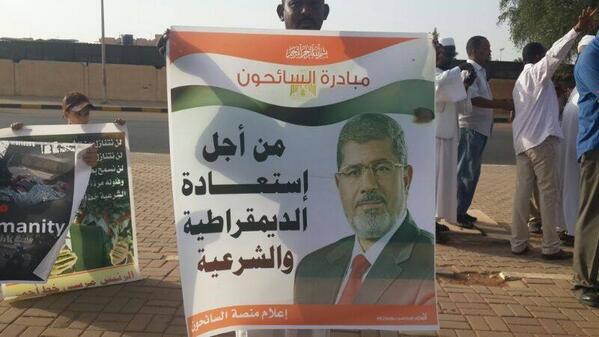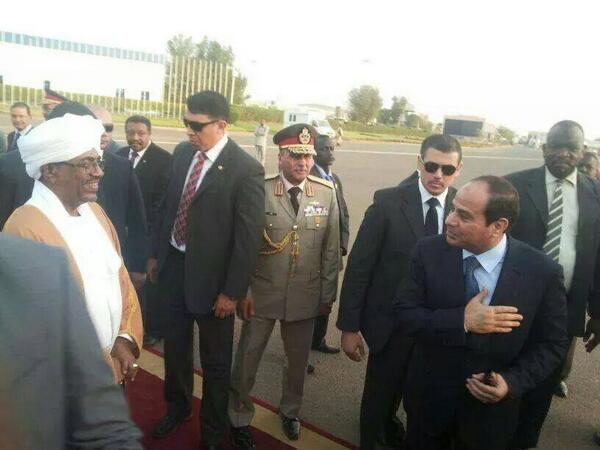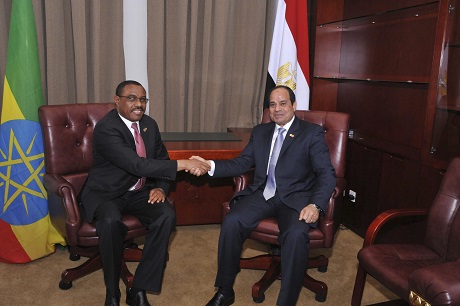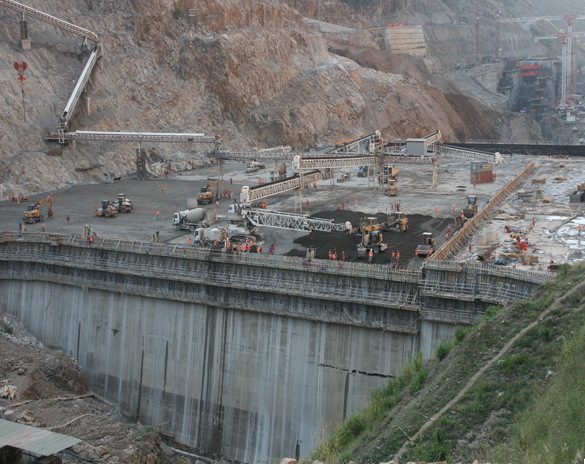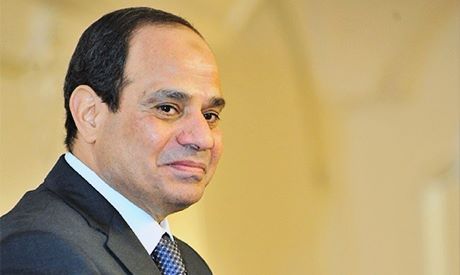The guests had been seated at the tables of the great hall in Addis Ababa, and fanfares rang out as the Emperor Haile Selassie walked in with President Gamal Abdel Nasser of Egypt at his right hand. Nasser was a “tall, stocky, imperious man, his head thrust forward and his wide jaws thrust into a smile,” next to him Selassie’s “diminutive silhouette,” his “thin expressive face, his glistening penetrating eyes” worn by the years. Behind the extraordinary pair, the remaining leaders also entered in their pairs, writes Ryszard Kapuściński in his chronicle of the fall of the Abyssinian monarchy and the intrigues at Selassie’s court. The audience rose; everyone was applauding. “Ovations sounded for unity and the Emperor. Then the feast began.”
Their corresponding persons, President Abdel Fattah El-Sisi of Egypt and Ethiopia’s Prime Minister Hailemariam Desalegn — a pair less extraordinary, their relations less gregarious —find themselves seated together on June 26 at the 23rd Ordinary Summit of the African Union in Equatorial Guinea. During his presidential campaign, El-Sisi spoke of his interest in travelling to Ethiopia “not once, but ten times” for the mutual benefit of the two countries. As El-Sisi addressed the crowd at his presidential inauguration ceremony at the Qubba Palace in Cairo, Ethiopia’s Foreign Minister Tedros Adhanom Ghebreyesus looked on among Arab royals, the First-Vice President of Sudan, Lieutenant General Bakri Hassan Saleh, and heads of state, from Chad’s Idriss Déby and Eritrea’s Isaias Afwerki to Teodoro Obiang Nguema Mbasogo, who has held power in Equatorial Guinea even longer than El-Sisi’s military predecessor, Hosni Mubarak. El-Sisi professed to the crowd he would protect pan-Africanism, and he wouldn’t allow Ethiopia’s self-financed Grand Ethiopian Renaissance Dam (GERD) to “cause a crisis or a problem with sisterly Ethiopia.” Over centuries, the Nile has tied the two countries together. Ethiopia’s priority now is power generation, while Egypt, a desert country, prioritises irrigation against the Nile water source countries on the Central African and Ethiopian plateaus, which have greater rainwater.
The GERD is a major issue of peace or war. As he summits in Malabo with Adhanom over Egypt’s Nile water crisis, El-Sisi finds himself confronted with deep and changing historical forces. When Britain occupied Egypt in 1882, Britain immediately understood it had become “ruler of a hydrological society,” and that the irrigation question was central to maintaining stability along its Suez Canal, notes Terje Tved, professor at the universities of Bergen and Oslo and an authority on the Nile. Then everything changed after the First World War, the collapse of the Ottoman Empire, and the Egyptian revolution of 1919, and yet Britain’s strategic interests remained the same. This trickled into a series of colonial treaties, including the 1959 Nile Waters agreement, which contributed to Sudan becoming Egypt’s downstream hydro-political ally, and safeguarded Egypt and Sudan’s over 90 percent share of Nile waters. Ethiopia, the source of the Nile, was left only with ghosts of discord. Selassie himself was left affronted by Nasser’s marginalisation of Ethiopia in the 1959 agreement, and was to be overthrown in a 1974 coup d’état. At the same time, notes a March 21 2011 memorandum from the international businessman and dam engineer Dr Ibrahim Mostafa Kamel submitted to the first post-Mubarak government of Essam Sharaf, since 1969 Egypt has lost an estimated 100 million tons annually of silt, “creating a 4.1 billion silt dump which lies over the Egyptian-Sudanese border.”
Even if he is a diminutive Nasser, El-Sisi’s jaws will not likely be thrust into a smile, even a wry one. It is not even sure whether there will be a feast as in Kapuściński’s tale, or if so, whether it will be sumptuous. Only three days before El-Sisi’s presidential inauguration, the governments of Ethiopia and South Sudan arrested three Egyptians reportedly sent by Cairo to spy on dam projects in South Sudan and western Ethiopia, principal among them the 6,000-megawatt GERD. Egypt fears the GERD is a threat to its lifeline, the Blue Nile at Ethiopia’s Lake Tana upon which Egypt depends for over 85%of its Nile water flow. As the dispute fanned to a flame earlier this year, Egypt boycotted talks over the dam as they ground to an acrimonious standstill, and followed with a diplomatic card game to enlist the support of external stakeholders and African countries keen to capitalise on strategic alliances.
The real threat to Egypt is the reaction of Sudan, given its part in the 1959 agreement; not the GERD itself. If there are signs of a rapprochement between Egypt and sisterly Ethiopia, it is by Egypt’s necessity; it coincides with a growing rift between El-Sisi’s Egypt and Omer Hassan Ahmed El-Bashir’s Islamist regime in Sudan, a former ally of Mohammed Morsi’s government of Muslim Brothers. Egypt courts South Sudan in spite of Sudan, and besides Egypt’s anti-Islamist alliance with Saudi Arabia, there are signs of a rapprochement with Libya’s anti-Islamist leader General Khalifa Belqasim Haftar. While the Sudanese vice-president Bakri Hassan Saleh attended El-Sisi’s presidential inauguration, he has also reaffirmed Sudan’s commitment to the GERD; Ethiopia is also an important strategic alliance for Sudan. One reason is its interests in the six-month long conflict in South Sudan.
The Nile Basin Initiative, which met in Khartoum last Thursday, has called on Egypt to re-involve itself in the activities in the initiative, which both Sudan and Egypt left four years ago in protest over the signing of the Nile Basin Cooperative Framework Agreement by four Nile Basin countries (Rwanda, Ethiopia, Uganda, and Tanzania). Burundi and Kenya later signed onto the NBI, which removes Egypt’s veto power over upstream irrigation and hydro-power projects. It is bound to reduce Egypt and Sudan’s historically protected Nile water share. After El-Sisi overthrew Morsi, Sudan returned to the NBI. Its new chairman also happens to be Sudan’s Minister of Water Resources and Electricity, Muattaz Musa Abdallah Salim. “I should like to place an appeal to our sister nation Egypt,” Salim said at the meeting of Nile Basin water ministers, according to AFP. “Your resumption of your activities in the NBI will further consolidate our gains and integrity in the region.”
For M. Jalal Hashim, a professor at Comboni University College and a close observer of Nile politics, the flutters of Khartoum’s heart have more to do with Khartoum’s calculations for political survival than technical issues connected with transboundary water management. “If Khartoum stood against the GERD, this may lead Ethiopia to host the military opposition of the regime, and the remaining of the regime in Sudan is a matter of inertia, not strength,” he says. “There is enough opposition to put it out.” During his brief reign, Morsi, who is now languishing behind bars in El-Sisi’s Egypt, showed his readiness to give the disputed area of land at the Egypt-Sudan border called the Halayeb triangle to Sudan, a matter Hashim thinks played a role in his overthrow.
When the Ethiopian delegation brought up the topic of the GERD for the first time, in Kampala according to Hashim, the Sudanese delegation was late by hours due to disruptions in airway programmes. When they joined the meeting, he says, they discovered that the Egyptian delegation had already blessed the project. They were “furious" and made clear their reservations to the GERD being built in an area vulnerable to volcanic eruptions and notified their minister, who, by his turn, notified his Egyptian counterpart in protest. “If such a tremor and earthquake takes place and destroys the GERD that would be disastrous to both Sudan and Egypt,” according to Hashim. “The water will be almost 26-metres high in Khartoum for days. The threat of dam collapse can wipe out Sudan, while Egypt would not be affected directly.”
The Sudanese experts repeatedly warned their government while negotiating with the Ethiopians, “hoping that wisdom would prevail, but in vain,” says Hashim. According to him, Khartoum’s position at the time prompted the Egyptian delegation to withdraw their agreement to the GERD, while Khartoum’s position has now aligned with the rising power of Ethiopia, which Egypt continues to contest. Even while Ethiopia’s award of a no-bid contract to an Italian company to construct the US$4.8bn. dam contributed, alongside Egypt’s earlier protests, to it being left without concessional finance, the World Bank is heavily invested in Ethiopia and region. At the end of last month, the bank approved US$178.5mn. credit and a US$254.5mn. grant to help Ethiopia develop its geothermal energy resources to boost electricity supply. Several electricity export contracts have already been signed, and Yemen’s Minister of Electricity Saleh Sumai and Adhanom have now agreed to begin studying electrical interconnection between the two countries across the Red Sea through Djibouti.
Ethiopia seeks to capitalise on its new economic development, part of which involves the Nile; Egypt faces the winds of an economic and national cohesion crisis. Sounds for unity are growing; but because Egypt is fast running out of alternatives, and faces major change on the Nile. As the late rebel-turned statesman Meles Zenawi said in an interview on Egyptian television, the relationship between the two countries is “like a very old marriage, which has no possibility of divorce. It has its ups and downs, but it is very solid. It is of long standing.” “Sometimes we quarrel, sometimes we agree,” Zenawi told the Egyptian interviewer, radio waves fizzing in the background. “That has been the case for thousands of years.”
Nizar Manek is an independent journalist reporting on Africa.
Copyright © 2014 Le Monde diplomatique—distributed by Agence Global


